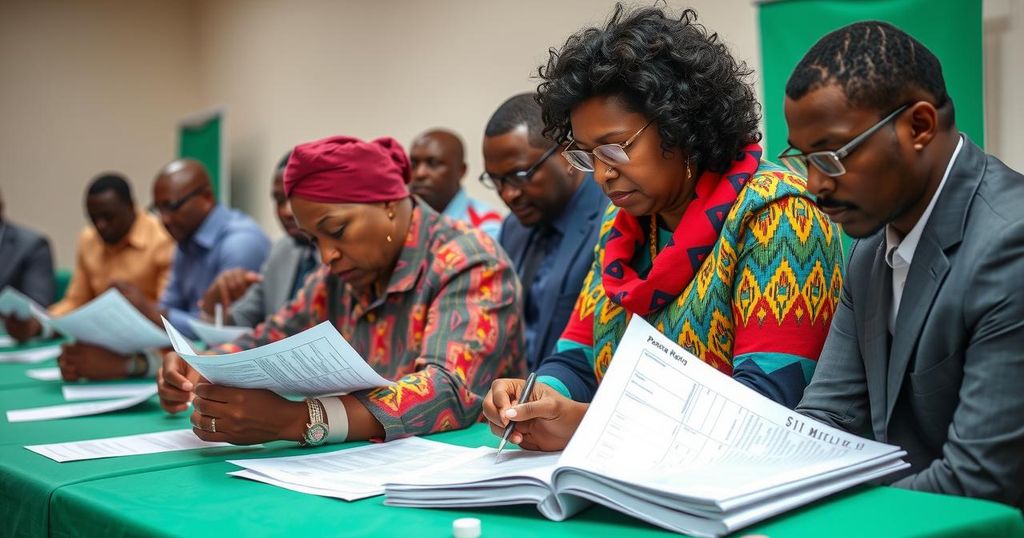Namibian Opposition Parties Granted Access to Inspect Election Materials

Namibia’s Electoral Court has permitted opposition parties IPC and LPM to inspect materials from the recent elections, amidst claims of irregularities and suppressed voter turnout. The ruling will support their legal challenge against SWAPO’s continued parliamentary majority. Concerns regarding the effectiveness of this inspection remain as critics argue that previous setups allowed for adequate monitoring.
On a recent occasion in Namibia, a significant legal advancement was made by two opposition parties, the Independent Patriots for Change (IPC) and the Landless People’s Movement (LPM), when the Electoral Court granted them permission to inspect materials from the recent presidential and legislative elections. This ruling is pivotal as the parties have disputed the election results, which led to the continued dominance of the long-standing ruling party, SWAPO, albeit with a diminished majority. Both parties are seeking potential evidence of inconsistencies they believe may have influenced the electoral process.
The opposition has expressed concerns regarding voter turnout being potentially hindered by a scarcity of ballot papers in certain areas. In response to these claims, critics of the election results have noted that while there may have been administrative irregularities, these issues were not significant enough to alter the overall outcomes. John Nakuta, a respected human rights lawyer from Namibia’s national university, commented on the situation, suggesting that the IPC and LPM are intent on substantiating their allegations of irregularities through this inspection process, which may lay the groundwork for further legal action based on their findings.
Following the court’s ruling, IPC spokesperson Imms Nashinge emphasized that this decision marks merely the initial phase of their ongoing legal challenge. He affirmed their stance of rejecting the election results, stating that they had voiced their refusal to acknowledge the electoral process prior to its conclusion. Similarly, other political entities, including the Popular Democratic Movement (PDM) and the United Democratic Front (UDF), have rallied in support of the IPC’s position.
Aligning with the court’s ruling, Elections Commissioner Pius Iikwambi remarked that an agreement had previously been made with the concerned parties to allow access to the election materials and that the ruling merely formalized this arrangement. Electoral commission spokesperson De Wet Siluka addressed criticisms by indicating that the opposition parties had the opportunity to observe the election process, but failed to utilize these opportunities effectively.
It is noteworthy that a total of twenty-two political parties contended in Namibia’s recent presidential and National Assembly elections, with thirteen securing seats in the National Assembly where SWAPO maintains a majority of fifty-one seats. The Electoral Court’s ruling enables the opposition parties to inspect the election results at various polling stations, although concerns persist regarding the effectiveness of these inspections in substantiating their claims.
The legal ruling stems from a backdrop of alleged electoral discrepancies following Namibia’s recent elections, in which the ruling SWAPO party maintained its parliamentary majority despite reductions. The IPC and LPM, both opposition parties, have contested the legitimacy of the results citing irregularities, including suppressed voter turnout due to logistical issues such as a lack of ballot papers. The situation has significant implications for Namibia’s democratic processes, as the opposition seeks clarity and accountability in the electoral system.
The Electoral Court’s recent decision allows Namibian opposition parties to inspect election materials, a critical step in their challenge against the results of the recent elections dominated by the SWAPO party. While the opposition aims to uncover potential irregularities, the electoral commission defends its processes and emphasizes prior opportunities for party observation. This ongoing legal battle underscores broader concerns regarding the integrity of elections in Namibia and the importance of democratic safeguards.
Original Source: www.voanews.com







